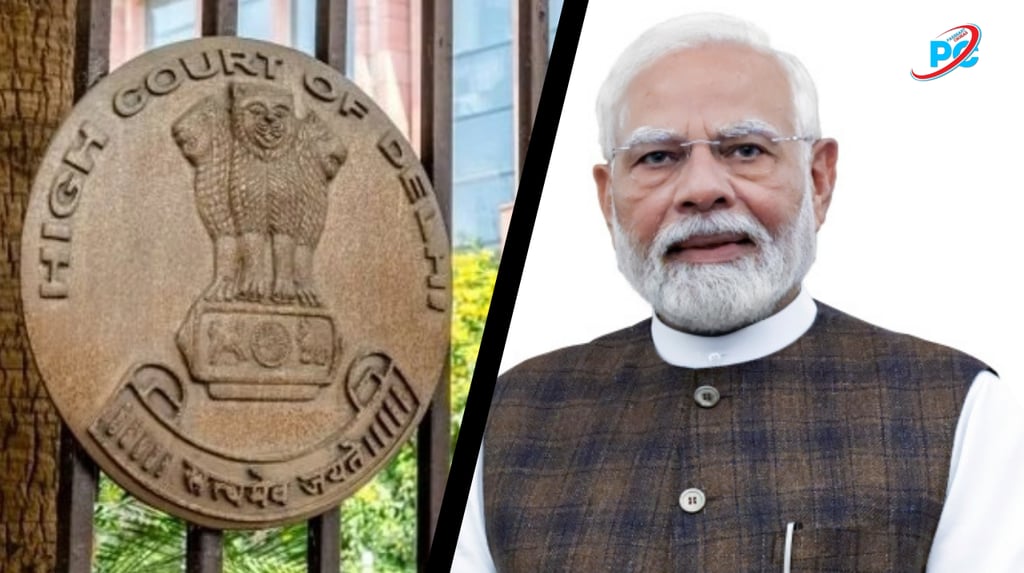Delhi High Court’s Verdict on Prime Minister Modi’s Degree: A Triumph of Privacy or a Blow to Transparency ?
Delhi High Court has struck down the CIC’s 2017 directive on disclosing Prime Minister Narendra Modi’s BA degree records, citing privacy over public curiosity. The judgment has reignited the debate between transparency and individual rights, with opposition parties decrying it as a blow to accountability, while the BJP hails it as a victory for privacy. Our editorial analyses the legal, political, and democratic implications of this landmark ruling.
DELHI HIGH COURTPRIME MINISTER OF INDIA SHRI NARENDRA MODI
Parshant Chohan
8/25/20254 min read


New Delhi : The Delhi High Court’s recent ruling, which nullified the Central Information Commission’s directive compelling Delhi University to disclose Prime Minister Narendra Modi’s undergraduate degree records, has reignited one of the most contentious debates within India’s democratic discourse – the perpetual tension between transparency and privacy. At the heart of the judgment lies a profound constitutional dilemma: to what extent should the personal details of a public figure, especially one occupying the highest elected office in the land, remain subject to public scrutiny under the Right to Information Act, 2005?
The Origins of the Controversy
The saga commenced in 2016, when RTI activist Neeraj Sharma sought access to the examination register of Delhi University, specifically for the batch of 1978 – the year in which Mr Modi claims to have graduated with a Bachelor of Arts degree. The University resisted, asserting that the information pertained to third parties and was thus exempt under Section 8(1)(j) of the RTI Act.
The CIC, however, took a diametrically opposite view. In December 2016, it ordered the disclosure of the register, reasoning that the academic qualifications of a public figure – particularly the Prime Minister – were matters of legitimate public interest. Transparency, it held, could not be sacrificed at the altar of convenience or bureaucratic discretion.
This order was swiftly challenged by Delhi University, which obtained an interim stay from the Delhi High Court in January 2017. What followed was nearly a decade of protracted litigation, with arguments oscillating between privacy and accountability, culminating in Justice Sachin Datta’s judgment in August 2025, which finally quashed the CIC’s directive.
Privacy Versus the Right to Know
The High Court’s reasoning, though delivered briefly, rests upon a foundational principle of modern constitutional law: the right to privacy. Following the Supreme Court’s landmark judgment in K.S. Puttaswamy v. Union of India (2017), privacy has been enshrined as a fundamental right under Article 21 of the Constitution. The Court appeared persuaded by Delhi University’s contention that examination records are held in a fiduciary capacity, that disclosure could compromise the privacy of thousands of students, and that mere curiosity – even if politically charged – does not constitute compelling public interest.
The Solicitor General, appearing for the University, sharpened this argument. He warned against the “dangerous precedent” of allowing decades-old academic records to be unearthed on political whims, emphasising that RTI must not become a mechanism for “embarrassing” individuals or intimidating public officials. He further noted that such records could, if necessary, be shown to the Court in camera but should not be indiscriminately revealed to the public.
By contrast, advocates for transparency contended that the Prime Minister’s academic qualifications are already in the public domain through electoral affidavits and that confirmation of the same would neither violate privacy nor constitute an undue burden. They pointed out that universities routinely publish results on noticeboards and websites, and that degrees, by their very nature, are state-conferred honours, not sacrosanct personal secrets.
The Political Dimension
Inevitably, the ruling has sparked sharp political reactions. Opposition parties, long sceptical of the Prime Minister’s educational claims, have described the verdict as a retreat from transparency. Congress leaders have argued that in a democracy, the public has an incontestable right to know the qualifications of its leaders. Aam Aadmi Party stalwarts, including Arvind Kejriwal, have maintained that shielding such information erodes the credibility of public office and casts unnecessary suspicion upon claims that ought to be easily verifiable.
The Bharatiya Janata Party, for its part, has welcomed the judgment as a vindication of its stance. Its leaders argue that the Prime Minister has consistently disclosed his educational qualifications in election affidavits and that the incessant demands for further proof are politically motivated fishing expeditions designed to tarnish his image. For them, the High Court’s verdict underscores the need to insulate governance from frivolous inquisitions masquerading as transparency.
A Precedent Laden with Consequences
The implications of the Delhi High Court’s decision extend far beyond the individual case of Mr Modi’s degree. It establishes a judicial precedent that bolsters the primacy of privacy in the contest with transparency, at least where academic credentials are concerned. Universities and public institutions may now feel emboldened to deny access to records of former students, irrespective of the public stature they subsequently acquire, unless a direct and substantial public interest can be demonstrated.
Critics argue that this reading risks diluting the very ethos of the RTI Act, which was conceived as an instrument of radical transparency, empowering citizens to pierce the veil of official secrecy. They caution that if privacy is interpreted too broadly, it may become a convenient shield for withholding information that is merely inconvenient rather than genuinely confidential.
Yet defenders of the judgment counter that unchecked transparency, too, carries dangers. It risks weaponising the RTI mechanism into a tool of political vendetta, where personal data are dredged up not for accountability but for sensationalism. In this light, the verdict may be seen as a necessary corrective, reaffirming that even the most exalted office-holder does not forfeit all claims to personal dignity and privacy.
The Editorial View
While the Court’s verdict is legally sound in its fidelity to the right to privacy, it leaves unresolved the broader democratic concern: should the educational qualifications of the Prime Minister remain shrouded in secrecy? It is one thing to protect the academic records of ordinary citizens; it is quite another to conceal the credentials of the nation’s chief executive.
The very act of resisting disclosure risks fuelling speculation, rendering what might otherwise be a mundane matter of record into a cause célèbre. In shielding the Prime Minister’s degree, the judiciary has inadvertently intensified the controversy it sought to extinguish.
Ultimately, this case epitomises the delicate balance India must strike between the individual’s right to privacy and the citizen’s right to know. The High Court has tipped the scales firmly in favour of privacy. Whether the Supreme Court, when inevitably called upon, will recalibrate this balance remains an open and urgent question.
By Parshant Chohan :
August 25, 2025 | Monday



